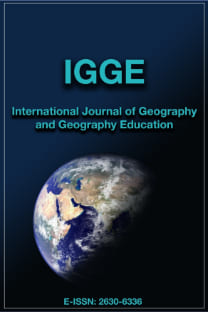PUBLIC SCHOOL AND PRIVATE SCHOOL GEOGRAPHY TEACHERS’ VIEWS OF DISTANCE EDUCATION
Public School and Private School, Distance Education, Geography, Teachers’ Views
PUBLIC SCHOOL AND PRIVATE SCHOOL GEOGRAPHY TEACHERS’ VIEWS OF DISTANCE EDUCATION
___
- Alper, A. (2020). Pandemi sürecinde K-12 düzeyinde uzaktan eğitim: durum çalışması. Milli Eğitim Dergisi, 49(1), 45-67. https://doi.org/10.37669/milliegitim.787735
- Balaman, F., & Hanbay Tiryaki, S. (2021). Corona virüs (Covid-19) nedeniyle mecburi yürütülen uzaktan eğitim hakkında öğretmen görüşleri. İnsan ve Toplum Bilimleri Araştırmaları Dergisi, 10(1), 52-84. https://doi.org/10.15869/itobiad.769798
- Başaran, M., Doğan, E., Karaoğlu, E., & Şahin, E. (2020). Koronavirüs (Covid-19) pandemi sürecinin getirisi olan uzaktan eğitimin etkililiği üzerine bir çalışma. AJER-Academia Eğitim Araştırmaları Dergisi, 5(2), 368-397. https://dergipark.org.tr/en/pub/egitim/issue/54643/753149
- Bostan Sarıoğlan, A., Altaş, R., & Şen, R. (2020). Uzaktan eğitim sürecinde fen bilimleri dersinde deney yapmaya ilişkin öğretmen görüşlerinin araştırılması. Milli Eğitim Dergisi, 49(1), 371-394. https://doi.org/10.37669/milliegitim.787933
- Büyüköztürk, Ş., Kılıç Çakmak E., Akgün, Ö. E., Karadeniz, Ş., & Demirel, F. (2015). Bilimsel araştırma yöntemleri (19. Baskı). Ankara: Pegem Akademi.
- Can, E. (2020). Coronavirüs (Covid-19) pandemisi ve pedagojik yansımaları: Türkiye’de açık ve uzaktan eğitim uygulamaları. Açıköğretim Uygulamaları ve Araştırmaları Dergisi, 6(2), 11-53. https://dergipark.org.tr/en/pub/auad/issue/55662/761354
- Çakın, M., & Külekçi Akyavuz, E. (2020). Covid-19 süreci ve eğitime yansıması: öğretmen görüşlerinin incelenmesi. International Journal of Social Sciences and Education Research, 6(2), 165-186. https://doi.org/10.24289/ijsser.747901
- Demir, F., & Özdaş, F. (2020). Covid-19 sürecindeki uzaktan eğitime ilişkin öğretmen görüşlerinin incelenmesi. Milli Eğitim Dergisi, 49(1), 273- 292. https://doi.org/10.37669/milliegitim.775620
- Gören, S. Ç., Gök, F. S., Yalçın, M. T., Göregen, F., & Çalışkan, M. (2020). Küresel salgın sürecinde uzaktan eğitimin değerlendirilmesi: Ankara örneği. Milli Eğitim Dergisi, 49(1), 69-94. https://doi.org/10.37669/milliegitim.787145
- Maxwell, J. A. (2018). Nitel araştırma tasarımı etkileşimli bir yaklaşım. (M. Çevikbaş, Çev. Ed.). Ankara: Nobel Akademik Yayıncılık. (3. Basımdan Çeviri 2013).
- Merriam, S. B. (2018). Nitel araştırma desen ve uygulama için bir rehber. (S. Turan, Çev. Ed.). Ankara: Nobel Akademik Yayıncılık. (3. Basımdan Çeviri 2009).
- Ministry of Health. (2020). Covid-19 (SARS-CoV-2 enfeksiyonu) genel bilgiler, epidemiyoloji ve tanı, Retrieved April 29, 2021 from https://covid19.saglik.gov.tr/Eklenti/39551/0/covid- 19rehberigenelbilgilerepidemiyolojivetanipdf.pdf
- Ministry of National Education. (2021a). Retrieved April 30, 2021 from http://yegitek.meb.gov.tr/www/sss.php
- Ministry of National Education. (2021b). Retrieved April 30, 2021 from http://yegitek.meb.gov.tr/www/sayilarla-uzaktan-egitim/icerik/3164
- Özdoğan, A. Ç., & Berkant, H. G. (2020). Covid-19 pandemi dönemindeki uzaktan eğitime ilişkin paydaş görüşlerinin incelenmesi. Milli Eğitim Dergisi, 49(1), 13-43. https://doi.org/10.37669/milliegitim.788118
- Özgül, E., Ceran, D., & Yıldız, D. (2020). Uzaktan eğitimle yapılan Türkçe dersinin öğretmen görüşlerine göre değerlendirilmesi. Milli Eğitim Dergisi, 49(1), 395-412. https://doi.org/10.37669/milliegitim.776137
- Öztürk, M. (2014). Coğrafya eğitiminde araştırma (2. Baskı). Ankara: Pegem Akademi.
- Sarı, E., & Sarı, B. (2020). Kriz zamanlarında eğitim yönetimi: Covid-19 örneği. Uluslararası Liderlik Çalışmaları Dergisi: Kuram ve Uygulama, 3(2), 49-63. https://dergipark.org.tr/en/pub/ijls/issue/56102/742188
- Sayım, F. (2019). Sosyal bilimlerde araştırma ve tez yazım yöntemleri (3. Baskı). Ankara: Seçkin Yayıncılık.
- Telli Yamamoto, G., & Altun, D. (2020). Coronavirüs ve çevrimiçi (online) eğitimin önlenemeyen yükselişi. Üniversite Araştırmaları Dergisi, 3(1), 25-34. https://doi.org/0.32329/uad.711110
- Toraman, E., & Kayalar, F. (2020). Pandemi sürecinde öğrencilerin uzaktan eğitime ilişkin görüşlerinin incelenmesi. Journal of Social and Humanities Sciences Research, 7(64), 4026-4033. http://dx.doi.org/10.26450/jshsr.2228
- Uyar, E. (2020). Covid-19 Pandemisi sürecinde sosyal bilgiler öğretmenlerinin uzaktan eğitime yönelik görüşleri. Kapadokya Eğitim Dergisi, 1(2), 15-32.
- World Health Organization. (2021). Retrieved April 29, 2021 from https://www.who.int/emergencies/diseases/novel-coronavirus- 2019/question-and-answers-hub/q-a-detail/coronavirus-disease- covid-19
- Yıldırım, A., & Şimşek, H. (2011). Sosyal bilimlerde nitel araştırma yöntemleri (8. Baskı). Ankara: Seçkin Yayıncılık.
- Yin, R. K. (2017). Durum çalışması araştırması uygulamaları. (İ. Günbayı, Çev.). Ankara: Nobel Akademik Yayıncılık. (3. Basımdan Çeviri 2012).
- Yayın Aralığı: Yılda 3 Sayı
- Başlangıç: 1996
- Yayıncı: Marmara Üniversitesi
KÜLTÜREL COĞRAFYA PERSPEKTİFİNDEN MEKÂNIN ELEŞTİRİSİ
Müjde AYDOĞDU, Muzaffer BAKIRCI
BALIKESİR'DE BESLENME ALIŞKANLIKLARINI ETKİLEYEN FAKTÖRLERİN VE ALGILARIN İNCELENMESİ
Göksel Kemal GİRGİN, Alper UZUN
SİYASİ COĞRAFYA VE JEOPOLİTİKTE KARİKATÜRLERİN KULLANIMI ÜZERİNE BİR DEĞERLENDİRME
Mücahit COŞKUN, Hüseyin ŞAHİNER, Onur CANBULAT
TEMPORAL AND SPATIAL ANALYSIS OF TRAFFIC ACCIDENTS: THE CASE OF BURSA CITY
Himmet HAYBAT, Hüseyin ZERENOĞLU, Tamer ÖZLÜ
Ahmet TOPRAK, Fethi Ahmet CANPOLAT
Adem SEZER, Cennet ŞANLI, Adnan PINAR, Hasan KARA
BALIKESİR'DE BESLENME ALIŞKANLIKLARINI ETKİLEYEN FAKTÖRLERİN VE ALGILARIN İNCELENMESİ
